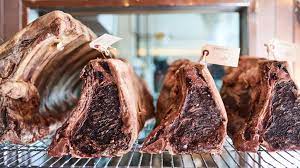The most recent report released by the Kenya Markets Trust states that an average Kenyan consumes 15kg annually. In a country of roughly 44 million Kenyans this translates to about 660 000 tons annually. This is just beef alone. The consumption of beef is not only huge in Kenya, but in the entire world standing at 346.14 million tons of meat yearly.
We asked Kenyans whether they would eat 1000-day meat in a survey. Mary, a mom of one said, “Aiii! Are you mad, in this Nairobi? Mbona, ata nikienda butchery I always have doubts, and if my guts tell me no, I leave.” “Upcountry, I wouldn’t mind it but not more than 60 days, during Christmas they slaughter the meat earlier and preserve it by drying it on the roof. It makes the meat softer and sweeter,” Dennis a communication specialist.
Elizabeth brought questioned quality of meat that has stayed that long. “Meat can easily go bad when mishandled leading to food poisoning. I avoid this at all costs; I buy meat from slaughter house. I proceed to preserve the meat myself at least I will eat the meat with peace of mind. But a 1000 day meat that’s madness.” In the survey, 74% of individuals voted against eating such meat. But do you know what you are missing out on?
“Why not, people don’t know what they are missing out. The sweetest meat is one that has been preserved for a long time. It has high nutrient value and protein content. As a chef I recommend it, especially preserving through drying.” Joseph a Chef. Only 26% of Kenyans voted they would eat aged meat.
Globally, there has been a wave of fondness for aged food products Nutritionist Navnit Birdi of Nutrion by Nav shares some light, “Aging helps to make the nutrients more available with additional benefit of natural enzymes acting on the meat during the aging process. This makes the meat tenderer, easier to chew and digest while at the same time increasing the flavour profile and overall satisfaction with the meal. The process changes the organoleptic characteristics of foods by developing a wide diversity of flavours, aromas, and textures. Fermented foods such as kimchi, meju, doenjang, etc are reported to have significant medicinal properties which help in the management of many diseases and conditions such as heart disease, gut imbalances, cancer, and more. The ‘aging’ process of foods helps to make the nutrients more available while improving flavour and texture to the food.” Why don’t you try out aged food products today?







